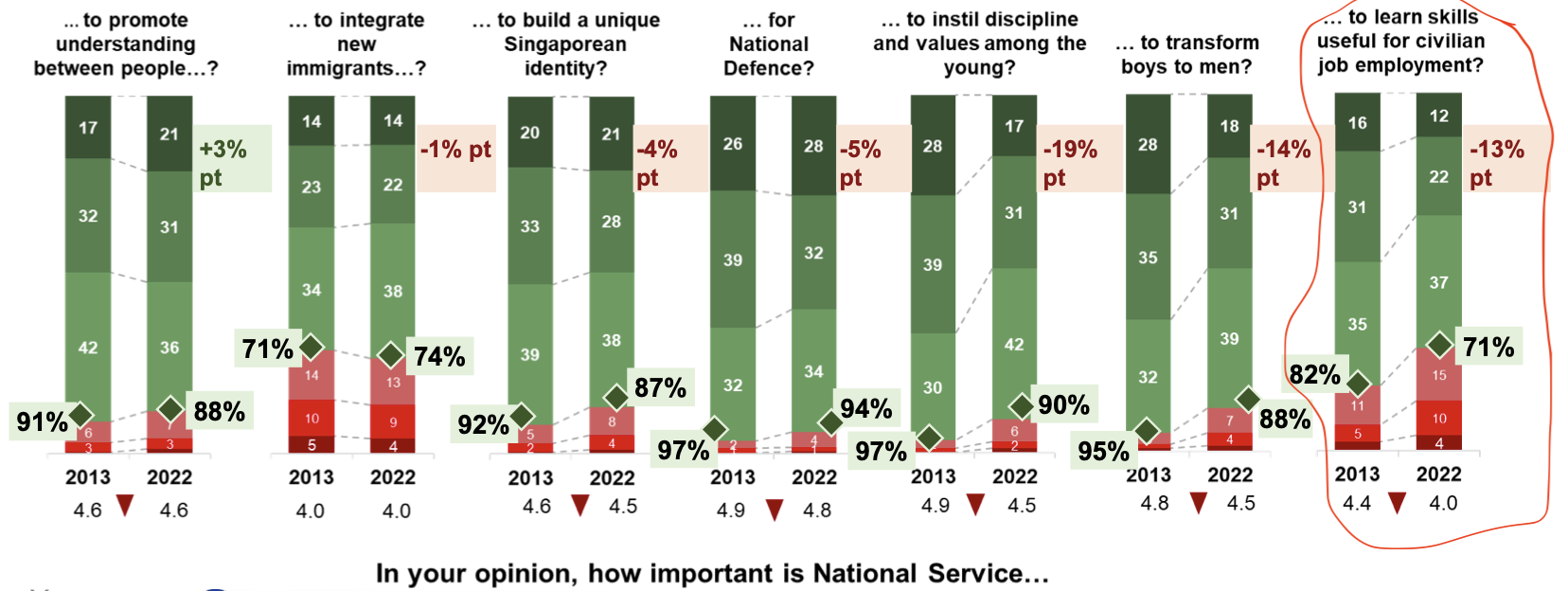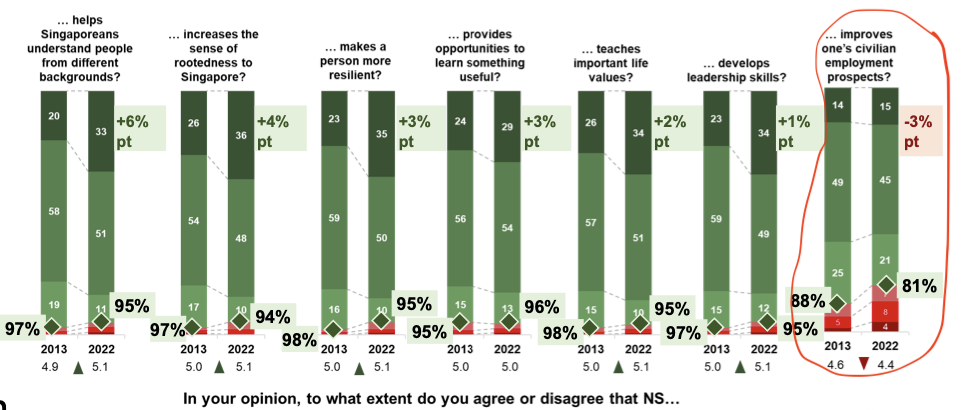The majority of Singaporeans agree that National Service (NS) is necessary for Singapore's defence.
However, fewer people now feel that NS improves their civilian employment prospects or provides transferrable skills for civilian work.
Some expressed that servicemen should be given more support to learn relevant workplace skills.
These were findings from a recent study conducted by researchers from the Institute of Policy Studies (IPS), which sought to understand public attitudes towards NS, and identify challenges that should be addressed in the current NS system.
From July to October 2022, they conducted interviews and focus group discussions with 91 Singaporeans, including servicemen and their families, employers and women.
Data from the study was then compared with a similar IPS study done in 2013.
Growing concerns on how NS contributes to employability
The study showed that there were growing concerns about how NS helps servicemen to learn relevant workplace skills.
71 per cent perceived NS to be important for learning skills useful for civilian employment. This was down from 82 per cent in 2013.
Specifically, the number of respondents who said that NS is "extremely important" and "very important" for learning skills that are useful for civilian employment dropped by 13 percentage points.
 Image from IPS.
Image from IPS.
The percentage of respondents that agreed that NS improves one’s civilian employment prospects also fell to 81 per cent, from 88 per cent in 2013.
The number of respondents who "strongly agreed" and "agreed" that NS improves one's civilian employment prospects dropped by three percentage points.
 Image from IPS.
Image from IPS.
Senior Research Fellow Chew Han Ei, the study's lead researcher, said this was likely because the labour market increasingly experiences a higher pace of change, and thus society places a higher emphasis on upskilling.
As such, he pointed out that "NS may increasingly be seen as a disruptor of work".
Many respondents, especially parents, also felt that more non-military training could be included to broaden servicemen’s skill sets.
Chew remarked that this reflected demographic changes in society, where servicemen increasingly come from more educated backgrounds, so parents might have higher expectations of how their children's time is being utilised during NS.
Trade-offs for career and income
Other respondents noted that NS commitments involve some trade-offs with education, career, and earning potential.
For example, reservist commitments could affect self-employed servicemen, or those who are in commission-based jobs, more severely.
One male respondent shared that during his one to two weeks' of reservist training, he would resort to engaging clients over the phone, which would be disruptive for his business.
Another female respondent was concerned that NS would cause a disruption to the servicemen's studies.
Additionally, servicemen from lower-income households could be disproportionately affected by NS, as they might struggle to contribute to household income during their NS tenure.
Chew remarked that while every servicemen bears a cost in serving NS, this cost of service may not be the same for everyone.
However, the study found that servicemen in such circumstances benefited from having more understanding and accommodating commanders, as well as better unit leadership.
Geopolitical tensions drive importance of national defence
The study also indicated that Singaporeans continue to show strong support for compulsory NS, with 93 per cent agreeing that NS should continue to be compulsory.
This was largely because respondents felt that NS is necessary for national defence (98 per cent) and the security that Singapore needs to prosper (97 per cent).
 Image from IPS.
Image from IPS.
Chew noted that NS continues to be important in the eyes of the public due to the heightened geopolitical tensions in our world today.
A few of the respondents, for instance, said that the Russia-Ukraine crisis was a good reminder of the importance of national defence.
They added that for Singapore, a strong armed forces would be a necessary deterrent against larger nations.
NS was also seen as important for reasons such as social cohesion, building a Singaporean identity, and instilling discipline and values among the young.
MINDEF initiatives to support NS personnel in studies
A spokesperson from the Ministry of Defence (MINDEF) said that the ministry will take into consideration the findings and recommendations from the study, and continually review how to strengthen the NS system.
To support national servicemen in their transition to employment or higher education, MINDEF partnered with NTUC LearningHub and NTUC Employment and Employability Institute (e2i) to set up the SkillsFuture@NS Learning eXperience Platform in September 2022.
This gives servicemen access to online courses, an online repository of resources including a job and course portal, and opportunities to participate in career and education fairs during their NS.
Under Work-Learn Schemes implemented since 2018, servicemen can also attain a diploma or partial university credits while performing full-time NS and an additional period of Regular service.
These are applicable for selected vocations, in roles critical for Singapore’s defence, such as in the areas of artificial intelligence and engineering.
Personnel may seek financial assistance, approval to work outside
As for full-time servicemen whose families face financial hardship, they may approach their unit commanders to apply for financial assistance.
Their unit commanders may also approve the serviceman's participation in a remunerative activity on an exceptional basis if it does not compromise his personal well-being and his ability to perform his NS duties.
Each request will be assessed on a case-by-case basis.
"MINDEF and SAF remain committed to strengthen the National Service system, and will continually enhance and enrich the NS experience of national servicemen," the spokesperson added.
Top image from MINDEF on Facebook.
If you like what you read, follow us on Facebook, Instagram, Twitter and Telegram to get the latest updates.



